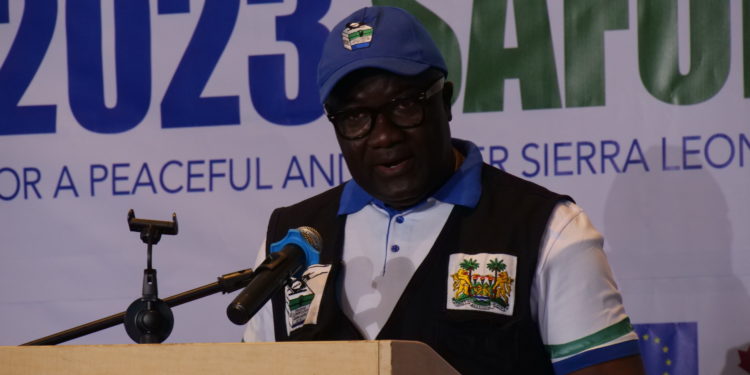The head of the Electoral Commission of Sierra Leone (ECSL), Mohamed Konneh, has said that they intend to conduct one of the best elections ever held in the country’s democratic history.
Mr Konneh said on Friday, the eve of the much anticipated June 24 general elections, that his team was determined to conduct free and fair elections, and calling on Sierra Leoneans, especially political party leaders, to ensure they that play their part in realizing this goal.
“The ECSL wants to assure the nation that it will conduct the elections in a free, fair, credible manner and wants to assure all that this election will be one of the best ever conducted in this country,” he said at a press conference.
The Elections Commission chief was addressing journalists in the presence of both local and international observers at the Freetown International Conference Center at the Bintumani Hotel in Aberdeen.
Over 3.3 million Sierra Leoneans will cast their votes for president, parliamentarians and local council representatives in what is the fifth elections since the country emerged from the 1991-2002 civil war.
These elections have been categorized as symbolic in that it is the first time the government is footing the larger chunk of the bill for the process. Political analysts say that it also has the potential to cement the country’s democratic path.
But concerns over violence have marred the process close to polling day. It followed complaints by the main opposition All People’s Congress (APC) that the ECSL wasn’t providing a level playing field.
About two weeks to the polls, APC issued a 72-hour ultimatum for the Commission to meet a set of demands, including the release of data of the registered voters and to declare that the results of voting will be transferred manually. The party requested that the ECSL management team resigned if they fail to meet its request.
Mr Konneh sought to address all those concerns at Friday’s press conference. He noted that election results had always been transmitted manually in Sierra Leone and that the only change this year was that electronic transfer of the results will be done only for administrative purposes and to serve as a back-up in case they need to verify the manually transmitted results.
Konneh dismissed “rumours” circulating on social media that the Commission had given the APC data about voters it had requested. The Electoral Commission chief said the only data it had given out was what all the other political parties had in their possession.
“ECSL has never changed our initial positions with regards data given to parties on June 8, which are limited to names…,” he said, adding that they have not released information like date of birth and telephone numbers of the voters, which were part of the demands of the APC.
Another bone of contention between the opposition party and the Electoral Commission was the point of tallying of results. APC wanted the results tallied at district level. But the ECSL boss said tallying will be done at regional level by district elections officials.
About announcement of final results, Mr Konneh said they have put in place modalities to cut down on the time it took in the last election for the winner of the presidential race to be known, although he declined to give a specific time, citing possible logistical limitations.
Friday’s presser provided a platform for officials to update the public about the state of preparedness in terms of security to ensure a hitch-free process. The ECSL has vowed to cancel election results in any area where violence mar the voting process.
The Office of National Security (ONS) is coordinating the security of the elections. Francis Langumba Keili, Chief of Staff at the ONS, disclosed that 16, 507 security personnel had been deployed across the country as part of this effort.
The Sierra Leone Police, he added, would be taking the lead, aided by the Republic of Sierra Leone Armed Forces under the Military Aid to Police policy. Other security agencies like prison police, road safety corps and chiefdom police will also aid in the efforts, said Kelli.
But he noted that they were cognizance of the need not to scare off potential voters by over securitizing the process. For this reason, according to Kelli, only unarmed General Duty police officers will secure the polling stations. No armed personnel will be in sight of the public, he said.
“We know elections is a civil process and we are not going to over securitize the process. No armed security will be seen at polling centers,” he said, adding that a Rapid Reaction Force will be at hand in case of any need.
Kelli also said that there will be no restriction on movement of people and vehicles on election day. He assured political parties that their agents will be free to be deployed everywhere across the country. But he said that no one will be allowed to jeopardize the peace of the country.






















